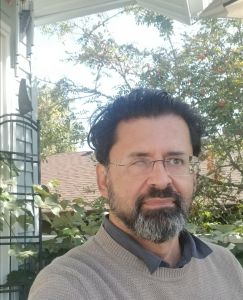Professor Vallega works on aesthetics in Continental thought, Latin American thought, and Ancient Greek philosophy. He has published books on Heidegger and space and on the aesthetic dimensions of philosophical thought. His work on phenomenology, hermeneutics, and art include writings on Andean thought, classical Chinese painting, impressionism, Paul Klee, as well as on the contemporary artists Alfredo Jaar, Cao Jun, and Anselm Kiefer. Some of his main influences are Plato, Heidegger, Gadamer, Derrida, Merleau-Ponty, and Benjamin. He is also the editor of a special issue of Epoché on Giorgio Agamben. He was president of The North American Society for Philosophical Hermeneutics and twice he has co-directed the Collegium Phänomenologicum in Cittá di Castello, Italy. He also has done extensive work in Ancient Greek thought, particularly Plato.
In terms of his work on Latin American thought and world philosophies, he is Faculty Research Fellow of the Center for Gender and Africa Studies of The University of the Free State, Souhth AFrica. He is the author of Tiempo y Liberación (Time and Liberation) (AKAL 2020) and Latin American Philosophy: from Identity to Radical Exterior, (Indiana 2015-16). He also is the editor and co-translator of the English translation of Enrique Dussel’s Ethics of Liberation. His work engages the history of Latin American philosophy, philosophy of liberation, popular and indigenous Latin American thought. Some of th figures he takes up in his work are Enrique Dussel, Aníbal Quijano, Rodolfo Kusch, Maria Lugones, Gloria Anzaldúa, Édouard Glissant, and Silvia Rivera Cusicanqui.
Professor Vallega currently is working on several projects that explore such issues as imaginaries and philosophical thought, the aisthetic pre-reflexive ground for rational conceptual thought. Vallega's work aim towards philosophy beyond the modern binary logic. A question at the center of his work is whether we may think existing through pluriversal relational ecological imaginaries.

